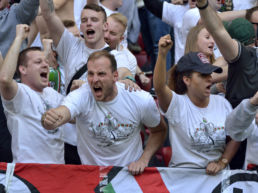Sophie Morris, Strategic Marketing & Sponsorship Director at Millharbour Marketing, shares her thoughts on how brands and rights holders can work together more effectively.

What do you do?
Sophie: At Millharbour, we help organisations improve commercial performance by putting their clients at the centre of their business. Through research and analysis, we help them understand the value they need to provide, support their decision-making, and embed the processes and frameworks needed to bring a strategy to life.
Within the sponsorship context, this ‘client-centred approach’ focuses on helping rights holders to create a compelling and differentiated sponsorship offering and improving the essential factors needed to drive sponsor satisfaction and increase retention.
How do brands choose which rights holders to work with?
Sophie: Brands will assess potential partners based on the fit between the two businesses and the extent to which they believe a rights holder can help them to achieve their business aims. Understanding exactly what information sponsors are looking for in order to make these decisions and then communicating that information effectively will make all the difference in driving that business decision.
Sponsors with a solid alignment between corporate, brand and marketing objectives will actively seek properties that show the potential to be able to deliver to all three aspects. For rights holders, understanding the breadth of the aims that sponsors are looking to fulfil, and having a proposition that can meet them, is therefore key.
However, many sponsors enter into sponsorship arrangements without having a set plan of what they want it to achieve. Rights holders have an important role here in guiding any sponsor through the process to determine what objectives should be set to help the sponsor’s overall business and therefore have the greatest impact.
What are brands looking for when they partner with a rights holder?
Sophie: The answer is two-fold. Firstly, sponsors look for what will best enable them to achieve their objectives; these could be commercial, community or colleague-based, for example. Secondly, sponsors require a specific set of factors that enable a successful partnership. This is something we are currently investigating as part of a global research study with Loughborough University.
This is where the term ‘partner’ in the question really comes into play. Are rights holders truly offering a partnership approach? What defines such an approach? The term is used too frequently as a shortcut (or re-labelling exercise) to make the property look more appealing without actually changing the attitude towards commercial partners. But there are specific parts of the planning and the delivery of a sponsorship, as well as the value and quality of what you deliver, that drives satisfaction for sponsors.
How has COVID-19 affected the relationship between brands and rights holders?
Sophie: COVID has tested the strength of sponsorship relationships for sure. I think it will either have identified critical flaws in a relationship or increased the strength and trust that already existed.
Which way that goes depends on the reaction to the situation. Were you looking straight at the contract and bringing lawyers in? Or were you openly communicating about the challenges you faced as organisations, and as individuals, and how you would work together to overcome them?
And it’s not over yet. Many rights holders still do not know if their events will take place on the original date, or even a rescheduled one. Sponsors are left in limbo, not knowing if they will receive the full range of benefits they were expecting, not knowing what to plan for and with Finance departments eagerly awaiting any chance of reclaiming rights fees.
In fact, ESA’s Sponsorship Market Trends data shows that ‘Better Sponsorship Relationships’ is now in the top 5 most important factors for how the industry will recover. I have written about that and how COVID has changed Sponsorship Market Trends here. At ESA, we continue to gather this data, along with a Sponsorship Sentiment Tracker, to see how trends change as we progress through the pandemic recovery.
Could you give an example of a brand / rights holder partnership that has really impressed you during the COVID-19 period?
Sophie: While there have been numerous excellent initiatives undertaken by both rights holders and brands to reinforce health messages, support keyworkers and reach out to their audiences, I think it’s too soon to see actual outcomes of what COVID-specific sponsorship activity might have achieved.
It has been interesting to see how activations have been adapted and to see new partnerships that have been announced during this time. Some may have been in the pipeline pre-COVID, of course, but others look to be creations of the opportunities that changing behaviour have created.
Looking outside of sport, I really like the Secret Cinema and Häagen-Dazs partnership ‘Secret Sofa’. Not only does it reflect how both companies have adapted to the lockdown situation, but also how they have understood changes in behaviour, identified opportunities and used their platform to reinforce the Stay at Home (and eat ice-cream!) message.
What does the next 12 months have in store for brand / rights holder partnerships?
Sophie: Working together even more closely as rescheduled events get confirmed or cancelled. We will see some certainty return, but we also need to plan for second waves, and more – possibly even localised – lockdowns that affect some events and not others.
We now have a better idea of how to deal with these situations. We are certainly better prepared for a sudden return to working from home once we’re back in the office. Nevertheless, conversations need to be had now to plan for if and when any further lockdowns occur.
I think that both parties need to reflect on this recent period and review how well the sponsorship has been, and is now, working. How satisfied are they? This is something that we have been working closely on too and it’s something that is really important to fully understand if you’re going to be able to make improvements.
I think we also need to build scenario plans for beyond what seemed reasonable previously. Expect the unexpected. We’ve seen the inevitable swing to digital, but we also need to consider the risks this presents. How many rights holders own their audience relationships directly without relying entirely on social media platforms, for example?
When live crowds return, what’s the first sporting event you’ll attend?
Sophie: That depends on when live crowds return!
I had bought tickets for the British Grand Prix (which would have been my 14th consecutive year!) and I’m waiting on a callback from them to transfer my tickets to next year, so depending on how things go, that may well be my next event!
I will certainly need to be assured of adequate safety measures for the whole event experience before I would commit to attending. The Government’s announcement last week about fans being allowed back in October is a bold move and I will be watching the pilot events over the next couple of weeks with interest, as I’m sure everyone else reading this will be too.
Sophie Morris
Strategic Marketing & Sponsorship Director – Millharbour Marketing
Board Director – European Sponsorship Association
Advisory Board – Institute for Sports Business, Loughborough University London
Rozie Fuller
Hi, I’m Rosie. A football mad, crazy horse lady… a rare species! Spend most of my life on social media to keep up with the latest news and hottest trends.
My most memorable sporting moment is …
My first ever trip to Old Trafford to watch Manchester United play (despite the fact we lost).
I am happiest when …
Spending time outside with my horse… even in the rain!
The sports person that best represents me is …
John Whitaker – always calm and collected under pressure.
The three things at the top of my bucket list are …
1. Go on a horseback safari
2. Get a dog of my own
3. Watch England lift a major international football trophy
A quote I try to live my life by is …
“I don’t do stress… it gives you wrinkles” - Me




